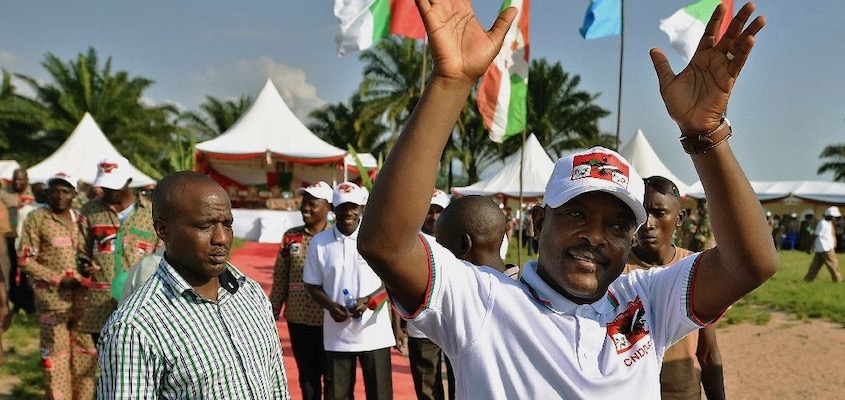by ANN GARRISON

Burundi is Africa’s Syria and Venezuela, a developing nation that dared to defy US dictates under Nkurunziza’s leadership.
“His legacy is his effort to reconcile Burundi’s Hutu and Tutsi classes and end the deep-seated, centuries-old hatred between them.”
Burundian President Pierre Nkurunziza, died suddenly on June 8th, reportedly of a heart attack. The new president, Évariste Ndayishimiye , who had been elected on May 20th, was sworn in ten days later, two months earlier than planned, in accordance with a decision by Burundi’s judiciary.
Burundi is a tiny East African nation bordering Rwanda to the north, Democratic Republic of Congo to the east, and Tanzania to the west and south. It is Africa’s Syria and Venezuela, a developing nation that dared to raise an independent head, contracted with a Russian firm to mine its nickel reserves, then survived the ensuing Western propaganda and covert operations. Russia and China came to Burundi’s aid by vetoing UN Security Council resolutions to censure it, which would have laid ground for a military intervention of one sort or another. Samantha Power, the USA’s violent, know-it-all Ambassador to the UN from 2013 to 2017, was as furious as she was when Russia and China vetoed resolutions to censure Syria.
Burundi is on the western edge of China’s One-Belt, One-Road Initiative in Africa. Venezuelan President Nicolas Maduro was quick to send his condolences to Burundians upon Nkurunziza’s death, writing, “We express our condolences to the people of the Republic of Burundi for the regrettable and unexpected physical departure of its president, Pierre Nkurunziza. My respect and solidarity with our brothers and sisters of Mother Africa at such a difficult time. Embrazos!”
I spoke to Edgar Muvunyi Tabaro, the author of an eloquent tribute first published in The Observer , a Ugandan outlet.
Ann Garrison: Edgar, your essay “Fare Thee Well, President Nkurunziza” is complex, nuanced, and historical, and I recommend it to anyone seeking to further understand the African Great Lakes Region. Could you summarize what you most hoped to make people understand about President Pierre Nkurunziza, what you hope his legacy will be?
Edgar Muvunyi Tabaro: President Nkurunziza taught at Burundi University and the military academy. His mother was a Tutsi nurse and his father a Hutu governor. The Hutu and Tutsi identities transfer patrilineally, from father to children, so he was a Hutu, but nevertheless born to an elite class. Despite privilege, he conducted his presidency in humble simplicity. He was very much in touch with the Hutu peasant majority, very accessible to them. His legacy is his effort to reconcile Burundi’s Hutu and Tutsi classes and end the deep-seated, centuries-old hatred between them.
He also kept his promise to step down and hand power over to a successor chosen by the people in a democratic election. Word had it that he wanted his party’s 2020 nomination to go to the president of the national assembly, the lower chamber of Burundi’s legislature, but the party’s executive committee preferred General Évariste Ndayishimiye, and he accepted that.
AG: You wrote about the assassination of Louis Rwagasore, a Tutsi prince who married a Hutu and joined a prominent Hutu politician to forge a movement that would move Burundi beyond polarization of the Hutu and Tutsi classes. Tutsi supremacists assassinated Rwagasore just before he was to become prime minister, then assassinated two Hutu prime ministers elected to follow him. The tyrant who then came to power committed genocide against 300,000 Hutu people. Can you explain what was so extraordinary about the way that President Nkurunziza engaged with this history?
Black Agenda Report for more
